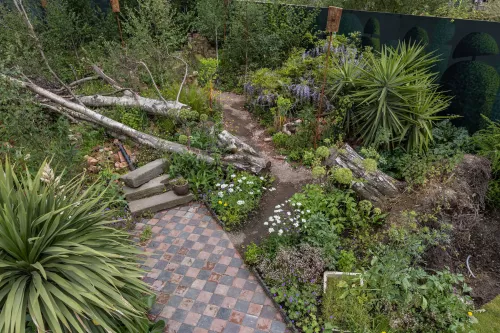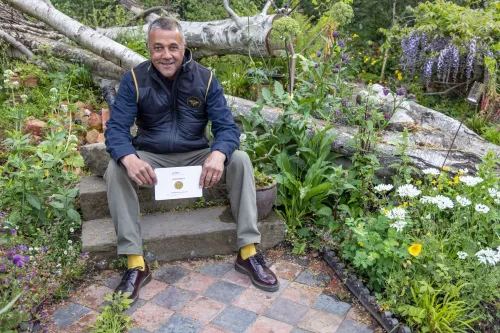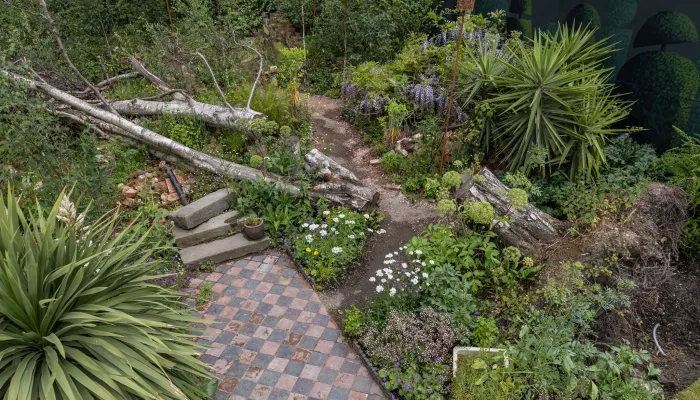Find out more about Centrepoint's award-winning garden at the Chelsea Flower Show 2023.
Giving homeless young people a chance to grow
The Centrepoint Garden explores the notion of home and celebrates the charity’s work in supporting young people facing homelessness.
The innovative and thought-provoking design by Cleve West offers a metaphor for the challenges faced by young people when their world becomes uprooted and fragmented.
The design highlights how Centrepoint offers a healing process, supporting and nurturing young people, to help them grow and realise their potential.
At the heart of The Centrepoint Garden is a demolished, and now ruinous, house. Over time, nature has taken over and begun to heal the scars.
So, what at first glance may appear to be a dysfunctional and fragmented space, is in fact a thriving, natural and evolving habitat. This helps to emphasise not only the import role a garden plays in making a house a home, but also that a broken home is not the end.
The Centrepoint Garden may not be pretty but neither is youth homelessness.

The Centrepoint Garden at the Chelsea Flower Show 2023
Our garden
When you first look at The Centrepoint Garden, you may think 'why there are so many “weeds” throughout it?' These resilient plants, such as Bellis perennis (common daisy) and Taraxacum officinale (dandelion), are important for a thriving ecosystem. For example, 115 invertebrates are associated with dandelions, including bees, for whom they are a good source of nectar because they flower early in the year. Their resilience is key for so many small animals and that's what makes them less “weeds” and more “hero plants”.
Many of the species in The Centrepoint Garden are vital to invertebrates, for example, Crataegus monogyna (hawthorn), has 130 types of butterflies or moths associated with it, far more than the traditional butterfly bush Buddleja davidii, which attracts 31 types of butterfly or moth. Both have a place in The Centrepoint Garden.
You may also spot the bird boxes around the garden. These unique designs were created by wood sculptor, Johnny Woodford, at his workshop in East Sussex. You may notice that they’re boarded up, this helps represent how hard it is for young people to move on from supported accommodation. Their past history of homelessness is often held against them by private landlords meaning homes are often closed off to them.
After the RHS Chelsea Flower Show finished, the bird boxes went to new locations, including some of Centrepoint’s hostels, where they have been opened up to become homes for nesting birds.
We are very grateful to Johnny, Crocus and Hortus Loci for all their support in creating The Centrepoint Garden. The garden would also not have been possible without the funding of Project Giving Back.
A closer look at the garden
Our garden is a metaphor for the challenges faced by young people when their world becomes uprooted, and how life can grow back stronger, with the right nurturing and support.
The broken path
The broken fragmented path alludes to the often difficult journey faced by a young person seeking a home.
The escapee houseplant!
An original houseplant has escaped to the garden thriving outside of the conventional home environment, like so many of the young people who are supported by Centrepoint.
The boarded-up bird boxes
(designed by Johnny Woodford) The boarded-up bird boxes represent the struggle for young people living in Centrepoint accommodation.
The piles of bricks
These rubble piles form part of the broken home but provide a positive message as they become a habitat for small mammals and insects. They were sown last autumn with wildflower and so-called weed seeds and left to grow without any maintenance.
The house footprint
The demolished house is a visceral metaphor for homelessness. The garden highlights that a broken home is not the end and life can thrive outside it.
The hearth
The hearth, in centre of the garden, is the only recognisable part remaining of the original home. It survives as a symbol or beacon for family life: warmth, light, food and security.
The topiary mural
Reminiscent of the hoarding seen around building sites, the mural depicts traditional topiary forms most gardeners are familiar with, in stark contrast to the looser associations within. It acts as reference to our tendency for control, when there might be opportunities where we can let nature have more of a say and let things find their own path.
The pointillist style of the painting uses more than 100,000 dots which represents the more than 100,000 young people facing homelessness every year in the UK.
The fallen tree
The large Silver Birch across the garden not only reflects being uprooted from your surroundings but was also selected as in Celtic mythology, it is one of the most sacred trees, symbolising new beginnings and protection. This tree was felled to make way for a reservoir.
We won gold
The Centrepoint Garden was never about the medal we might win but the opportunity to raise awareness of the thousands of young people who face homelessness.
That said, we were blown away by Cleve's design from the moment we saw it. To look at it now, knowing the hard work that he and his team have put into realising his vision, a Gold is thoroughly deserved. We are delighted for Cleve and so proud of this garden.

Cleve West at the Centrepoint Garden 2023 - Credit: Rebecca Kennington
Meet the garden designer
Cleve West
Multi-award-winning garden designer, Cleve West, returned to RHS Chelsea Flower Show after seven years away to create The Centrepoint Garden.
Cleve has won six RHS Gold Medals and is the only designer to have won the Best in Show accolade two years in succession for The Telegraph (2011) and Brewin Dolphin (2012).
But it wasn't medals or accolades that drew Cleve back to the show - it was the work carried out by Centrepoint.
He said: “I admire the work that Centrepoint provide in helping homeless young people re-build their lives and I was keen to create a garden for them which shines a light on that valuable work. I also like the idea that gardens may play an important part in future Centrepoint centres for young homeless people.”
Young people gardening
In April 2023, six young people supported by Centrepoint were able to take part in a once-in-a-lifetime opportunity, thanks to the generosity of the Royal Windsor Rose and Horticultural Society and its supporters.
Throughout the four-day course, the young people experienced biodynamic farming at Waltham Place, learnt about green keeping at Wentworth as well as understanding the basics of potting and planting from Crocus. As part of the course, Cleve West hosted two workshops and the young people took a tour of Windsor Great Estate as well as a private visit to Windsor Castle.
The course aimed to provide the young people with skills and insights into a potential career route that might not have been open to them or even considered before.
Legacy of the Centrepoint garden
The Centrepoint Garden was made possible thanks to Project Giving Back. Their grant-making scheme fully funded the development, design, exhibition and build.
Project Giving Back’s support means that the garden did not just exist for the week of the show.
After the gates closed, elements of The Centrepoint Garden were relocated to one of Centrepoint’s hostels in Ealing, creating an exciting and engaging outside space for the young people to maintain and relax in.
Thanks to everyone who made the garden possible
Project Giving Back – Sponsorship
Cleve West – Design
Crocus – Build
Hortus Loci – Providing plants




